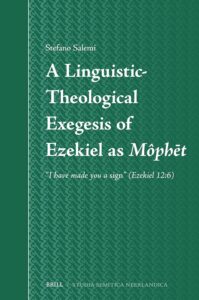SALEMI, S. A Linguistic-Theological Exegesis of Ezekiel as Môphēt: “I Have Made You a Sign” (Ezekiel 12:6). Leiden: Brill, 2024, 262 p. – ISBN 9789004691025.
Em Ez 12,6 Iahweh diz ao profeta: “Faço de ti um sinal para a casa de Israel”. O que significa ser um מופת (môphēt = sinal) para a história do profeta Ezequiel e para a teologia do livro que leva seu nome? Ezequiel é chamado de מופת apenas quatro vezes no livro. Nos capítulos 12 (versículos 6 e 11) e 24 (versículos 24 e 27). O lexema é usado para identificar o profeta dentro do contexto de duas ações simbólicas. Portanto, como definir esta experiência profética? O que o lexema מופת indica? De que forma מופת identifica o profeta?
teologia do livro que leva seu nome? Ezequiel é chamado de מופת apenas quatro vezes no livro. Nos capítulos 12 (versículos 6 e 11) e 24 (versículos 24 e 27). O lexema é usado para identificar o profeta dentro do contexto de duas ações simbólicas. Portanto, como definir esta experiência profética? O que o lexema מופת indica? De que forma מופת identifica o profeta?
A narrativa apresenta o papel do profeta como מופת começando no contexto da saída da glória de Iahweh do templo e culminando na perda de sua esposa como prefiguração da destruição do templo. O livro retrata esta realidade como um processo que começa com a visão da carruagem do capítulo 1. A visão descendente de Iahweh no capítulo 1 encontra sua completude com a partida do כבוד como um movimento ascendente no capítulo 12. Naquele exato momento, Ezequiel é chamado a assumir uma espécie de nova identidade, a de um מופת (sinal). Esta identidade atingirá o clímax da sua expressão na experiência da morte da esposa do profeta no capítulo 24. A visão inicial do livro é uma irrupção gráfica e avassaladora da presença divina no mundo do profeta e do povo de Israel.
O papel desempenhado pelo profeta como מופת no quadro da presença e ausência de Iahweh e da experiência traumática do exílio é um elemento-chave no meu estudo. Consequentemente, será dada atenção específica aos dois capítulos acima mencionados (nos quais ocorre o lexema) onde Ezequiel parece funcionar como um símbolo das ações, presença e relacionamento de Iahweh com Israel. A razão de ser deste fenômeno é de suma importância para uma percepção mais clara da teologia do livro.
Pretendo explorar as questões hermenêuticas e teológicas levantadas pela minha pergunta: Ezequiel, o que significa que você é um מופת (sinal)?
Portanto, este estudo se concentra na interpretação do significado, papel e influência da afirmação de Ez 12,6 em relação a Ezequiel como מופת dentro da narrativa do livro de Ezequiel, através das lentes da semântica, da exegese e da teologia (Trechos do Capítulo 1: Ezequiel é um môphēt).
Stefano Salemi é estudioso nas áreas de Bíblia, línguas bíblicas e teologia. Ele ocupou ou continua a ocupar cargos de pesquisa em várias universidades, incluindo Harvard, Yale, Oxford, Faculdade Teológica Pugliese (Itália), Pretória, Sheffield e Jerusalém.
The book of Ezekiel contains a very distinctive statement. In chapter 12:6, YHWH says to the prophet “I have made you a מופת (יָךּתִ תַ ְנ תמֹופ )1 for the House of Israel.”2 What does being a מופת imply for the story of the prophet Ezekiel and for the theology of the book that bears his name? Ezekiel is called מופת only four times in the book.3 In chapters 12 (vv. 6, 11) and 24 (vv. 24, 27), the lexeme is used to identify the prophet within the context of two specific symbolic actions YHWH called him to perform. Therefore, how to define this prophetic experience? What does the lexeme מופת indicate? In which way does מופת identify the prophet?
 The narrative unfolds the role of the prophet as a מופת beginning in the context of the departure of YHWH’s glory from the temple and reaching a culmination in the loss of his wife as a prefiguration of the destruction of the temple. The book portrays this reality as a process beginning with the chariot vision of chapter 1. The descending vision of YHWH in chapter 1 finds its completeness with the departure of the כבוד as an ascending movement in chapter 12. In that very moment, Ezekiel is called to assume a sort of new identity, that of a מופת. This identity will reach the climax of its expression in the experience of the death of the prophet’s wife in chapter 24. The opening vision of the book is a graphical and overwhelming irruption of the divine presence into the world of the prophet and of the people of Israel.
The narrative unfolds the role of the prophet as a מופת beginning in the context of the departure of YHWH’s glory from the temple and reaching a culmination in the loss of his wife as a prefiguration of the destruction of the temple. The book portrays this reality as a process beginning with the chariot vision of chapter 1. The descending vision of YHWH in chapter 1 finds its completeness with the departure of the כבוד as an ascending movement in chapter 12. In that very moment, Ezekiel is called to assume a sort of new identity, that of a מופת. This identity will reach the climax of its expression in the experience of the death of the prophet’s wife in chapter 24. The opening vision of the book is a graphical and overwhelming irruption of the divine presence into the world of the prophet and of the people of Israel.
The role played by the prophet as מופת within the frame of YHWH’s presence and absence and the traumatic experience of the Exile, is a key element in my study. Consequently, specific attention will be paid to the above-mentioned two chapters (in which the lexeme occurs) where Ezekiel seems to function as a symbol of YHWH’s actions, presence, and relationship with Israel. The raison d’être of this phenomenon is of paramount importance for a clearer perception of the theology of the book.
I intend to explore the hermeneutical and theological issues raised by my question: Ezekiel, what does it mean you are a מופת (sign)?
Therefore, this study focuses on the interpretation of the meaning, role and influence of the statement of Ezekiel 12:6 in regard to Ezekiel as מופת within the narrative of the book of Ezekiel, through the lenses of semantics, exegesis, and theology.
Stefano Salemi is a scholar of biblical studies, languages, and theology. He has held or continues to hold research posts at various universities, including Harvard, Yale, Oxford, Theological Faculty of Apulia, Pretoria, Sheffield, and Jerusalem.